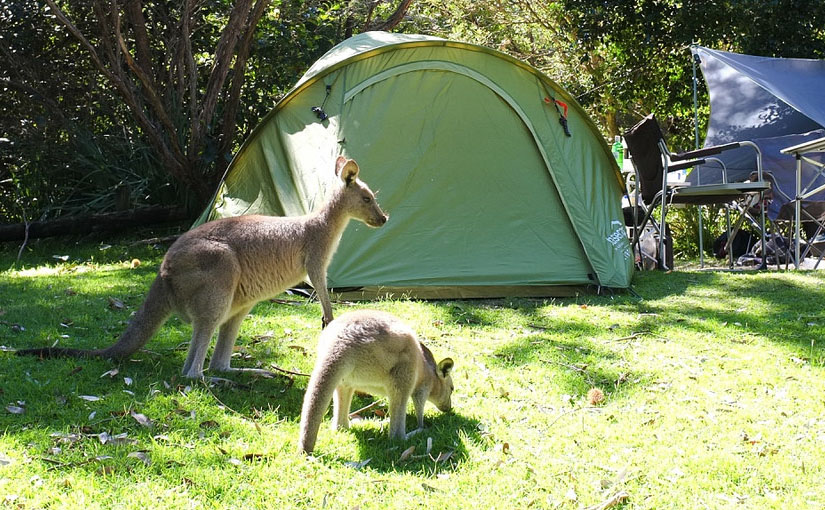While camping or caravanning in some remote regions in Australia, don’t be surprised if you find yourself in the company of interesting wildlife. The country’s vast outback is the natural habitat of many animals. While some of these critters avoid human interaction, others are keen to show up and for no good reason. Camping in the outbacks is sure to bring your closer to the wildlife so it’s best to be knowledgeable about what you may encounter, both for your safety and theirs.
Kangaroos, Wallaroos, and Wallabies
Kangaroos are native to Australia and are found everywhere. Wallabies are smaller versions of them but are of the same family. These unique marsupials are quite a sight to behold especially if it’s your first time seeing them. Friendly and harmless as they may seem, it’s best to be cautious. When a male kangaroo feels threatened, they may get aggressive and give you a double kick in the gut.
If a male kangaroo turns wild, move away quickly without turning your back and find a place to hide. Don’t attempt to run because it can easily catch you. Try to find a stick or any long object to ward off the animal. One good trick to make a kangaroo leave you is by coughing deeply while bending over and refraining from looking at it directly. This signals to the animal that you are not a threat.
Crocodiles
Saltwater crocs are the animals that you shouldn’t hesitate to run from. Their instinct is to attack and eat their prey. These reptiles can grow up to seven metres long and are great in the game of hunting. If you happen to be camping near the coasts of Northern Queensland, Northern Territories, and Western Australia, then try to stay at least 50 metres away from any bodies of water that connect to the sea.
On the other hand, freshwater crocodiles that are found in streams and billabongs are mostly harmless. They only grow up to four metres long and won’t readily attack unless provoked.
Snakes
Much like kangaroos, snakes are animals that you may encounter anywhere in the country. Some of Australia’s most poisonous snakes include:
- Brown Snake – Found on the east coast, it’s responsible for more than 60% of snake-bite-related fatalities in the country.
- The Inland Taipan – Known as the most venomous snake in the world, this incredibly deadly snake lives in the eastern desert region.
- Coastal Taipan – Irritable and aggressive, the Coastal Taipan can be found at the Queensland coast and Northern Territory
- The Common Death Adder – Characterized by its triangular head, the Common Death Adder has the longest fangs amongst Australian snakes.
- Copperhead Snakes – Better known as Austrelaps, copperheads are commonly found in south-eastern part of Australia.
Snakes are mostly active during the warm seasons like spring and summer, after coming out of hibernation. Protect yourself by wearing high boots and loose pants. Remember to be wary of snakes hiding underneath piles of wood or logs when collecting wood for a fire. If you happen to see one near your camp, leave it be and don’t try to kill or catch it because that’s when they become dangerous.
Poisonous Spiders
Other dangerous creatures that you may encounter while camping in Australia are poisonous spiders. While most spiders are not exactly toxic, a good number of species should be avoided: Redback Spider (South Australia and Western Australian Deserts), Sydney Funnel-Web Spider (Sydney, NSW), and White-Tailed Spider (Southern and Eastern Australia).
Luckily, antivenom for most kinds of spider bites is available. If bitten, regardless of the kind of spider, rush to the nearest hospital for proper treatment.
Dingoes
Dingoes are a type of dog that is indigenous in Australia. They are omnivorous and eat small to medium-sized animals like frogs, fish, rabbits, rodents and, birds. These wild dogs also eat plants and fruits. Dingoes are scattered in many regions across Australia. They can be found in the deserts of Central Australia, temperate regions in the east coast, the wetlands and tropical forests in the north, and the alpine moorlands in the Great Dividing Range.
Dingoes usually keep their distance from people but may display aggressive behaviour when they are hungry and can smell food nearby. It’s best not to leave food or any items with a strong smell outside your tent or caravan to avoid attracting dingoes. Dispose of trash away from your campsite if possible and keep the campsite tidy at all times.
If you see a dingo around your camp, travel in groups and don’t leave children or pets alone. Avoid running or jogging because it could aggravate the dingoes.
Goannas
The goanna is a monitor lizard that is considered a pest in many camping areas in Australia. They can survive in any type of environment and can grow up to two metres long. Goannas feed on small animals, dead animals’ decaying flesh, and campers’ food. Yep, that’s right — these lizards have a habit of snatching smelly meat from camps. So, keep your food out of the open or goannas will steal them when you’re not looking.
Also, these lizards don’t usually go near people, but they may bite if you try to approach or catch them. Although not as toxic as spider or snake venom, a goanna bite can cause wounds that do not heal fast.
Possums and other Small Marsupials
Just like goannas, marsupials like possums, bandicoots, and wombats hang around camps and try to steal food. However, they are more intelligent and crafty with their ways. Make sure to close your caravan or tent if you want to keep your food supply intact. Keep your distance from these animals because they may carry disease or bacteria that can easily spread to people.
Australia is also home to koalas, platypus, echidnas, different bird species, and other fascinating creatures. Whichever wildlife you encounter, remember to treat them with respect and care. No matter how dangerous or friendly these creatures might be, they contribute to the beauty of the Australian outback in one way or another.
Aussie Leisure Loans
If you are looking to buy a caravan for family trips, Aussie Leisure Loans can help you get a loan from our trusted lenders. They also work to give you competitive interest rates, so give them a call on 1300 889 669 or apply online today.





